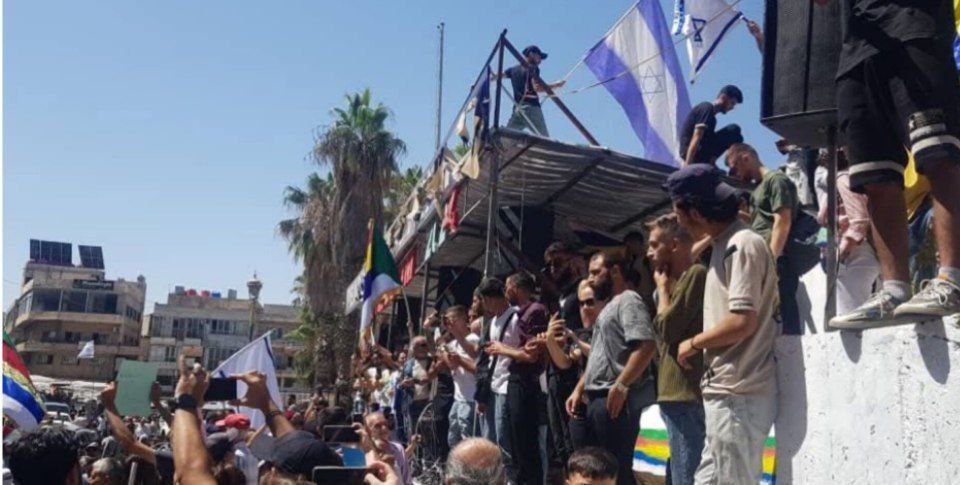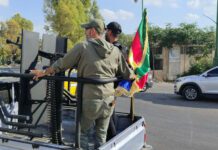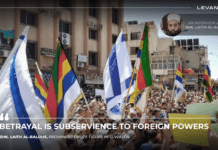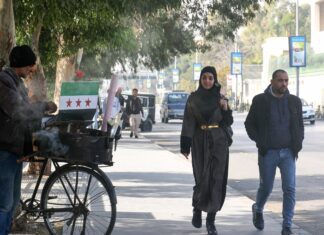
Civilians continue to flee the southern Syrian province of Suwayda, where fighting and political turmoil have upended daily life. According to UNICEF, nearly 192,000 residents have been displaced since mid-July due to ongoing violence and shortages of food, fuel and medical supplies.
Aid convoys carrying flour, fuel and medical materials enter daily, part of joint efforts by the Syrian government and humanitarian groups to stabilize the region. Yet sporadic clashes and roadblocks imposed by armed factions continue to hinder relief efforts.
Hijri’s Movement at Odds With Syrian Unity
The unrest in Suwayda has been exacerbated by the actions of followers of Sheikh Hikmat al-Hijri, one of the Druze sect’s three leading clerics. His supporters staged a demonstration August 16 in al-Karamah Square, raising Israeli flags and calling for Tel Aviv’s intervention. Chants of “We want Israel” and banners demanding “independence” highlighted the group’s rejection of Syrian unity.
According to local sources, Hijri’s militias stormed Druze religious centers in Ain al-Zaman and Sahwah al-Balat, the centers belonged to Sheikhs Yusuf al-Jarbou and Hamoud al-Hanawi. The attackers later displayed Hijri’s portrait with the Israeli flag raised over the building, further inflaming tensions within the community.
Druze leaders outside Syria, including Lebanon’s Progressive Socialist Party, led by former president Walid Jumblatt, have also denounced Israeli exploitation of the crisis and emphasized reconciliation under the Syrian state—as has Jordan’s Druze FM Ayman Safadi.
Ties With Regime Remnants and Criminal Networks
Hijri’s faction has drawn criticism for its alliances. The cleric’s self-styled “Supreme Legal Committee” recently appointed Brig. Gen. Shakib Ajoud Nasr, a former Assad-era security officer accused of past abuses, to head internal security in Suwayda. Analysts warn that the move signals continued collaboration with regime remnants seeking to destabilize the post-Assad political order.
Researchers and local activists accuse Hijri’s network of providing cover for drug traffickers, kidnappers and other criminal groups. His participation in conferences alongside Kurdish separatists of the Syrian Democratic Forces and representatives of sectarian councils has reinforced perceptions that his agenda aligns more with foreign interests than with local needs.
Calls for Unity Against Fragmentation
While Hijri’s supporters advocate secession, other voices in Suwayda and beyond stress reconciliation. Grassroots initiatives, such as the campaign “Suwayda in the Heart of Syria,” have sought to counter divisive rhetoric and promote coexistence. Damascus has denounced Israeli involvement, reiterating that the protection of Syrian minorities is the state’s responsibility.
“The Druze are an indigenous component of Syria,” Syrian officials declared, rejecting what they described as “blatant interference” by Israel. Civil society actors in both Suwayda and neighboring Daraa have echoed the call, urging Syrians to resist sectarian exploitation and restore stability.
As convoys of displaced families continue to move through the Busra al-Sham corridor, residents are left grappling with the consequences of sectarian politics. For many, the influence of Hijri’s faction does not represent protection, but an obstacle to peace and national unity.








